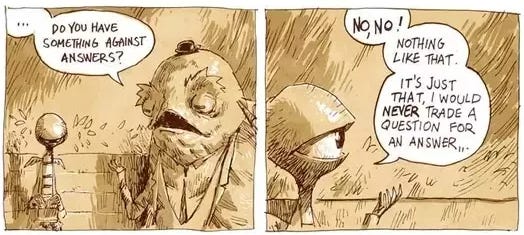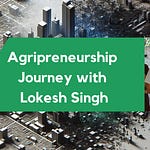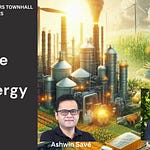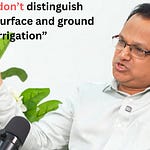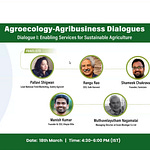Now wait a minute. Did you sign up for the wrong newsletter?
Why on earth am I talking about Mahatma Gandhi, idealism and meaningful livelihoods in a newsletter titled “Agribusiness Matters” which focuses on discovering systems thinking in food and agriculture in an age of runaway Climate Change?
You see, that is the point. That is exactly why I ought to.
One of the alluvial pleasures of writing Agribusiness Matters is that I can pretend to be a philosopher and ask fundamental questions about quality, technology, agribusiness, culture, impact and history of agriculture.
Here is the underlying question that animates this podcast.
Should founders redesigning food and agriculture systems of the future explore a thesis around meaningful entrepreneurship? Is it necessary in today’s uncertain funding/economic climate? If yes, why?
After all, we are dealing with a sector that flirts with “impact” (for good and bad reasons) far more than any other. And if this were the case, how can entrepreneurs design meaningful livelihoods without exploring a fundamental hypothesis of a life centred around idealism?
If you are a founder or investor working in food and agriculture systems, should you have a “sacred” hypothesis of idealism (not ideology) in the first place that you can benchmark against? How would you compute your moral balance sheet? How would you navigate your “inner game” of entrepreneurship with the tensions of idealism?
If you’ve ever wrestled with these questions, this podcast with Krishnan Subramanian, Co-Founder and Director, of Yellow Bag Foundation could be a game changer. Call it it, if you will, a chicken soup for the entrepreneurial soul who particularly works with Nature as a stakeholder.
You see, the contents of what Krishnan is doing at Yellow Bag may or may not be important for many of us
But the context behind why Krishnan is doing what he is doing at Yellow Bag Foundation and the process, as he shares candidly, that unfolds underneath is extremely important for most of us.
In this beautiful podcast with Krishnan where he bravely bares his inner travails and moral dilemmas, I discovered a few fascinating insights:
Mahatma Gandhi wasn’t a Luddite. At least, in the conventional sense of the word.
Idealism is never a static target. You hold on to your ideals until it evolves and grows.
You can never know beforehand when you are ready to take risks in life.
Interacting with a child is an act of being with nature.
In the entrepreneurial world, it is sine qua non to distinguish between your central idea and the tools and methods you employ to take your idea forward.
It doesn’t mostly happen in life when you wake up one day with an idea and stay with it all through your life.
When you live with nature, your stakeholder changes with time.
When you have the planet Earth as a stakeholder, you should be doing minimal damage to nature. Agriculture is a volatile domain because planet Earth is the most ruthless stakeholder of your business out there.
When you play games of entrepreneurship, you have to get comfortable dealing with dharmasankatas -double bind where I am damned if I do, damned if I don’t.
To create impact, you have to survive. We don’t live in an ideal world. We live in the current world. When we set boundaries on what to do, we should also be willing to let go of the benefits that it creates.
After your survival and that of your immediate stakeholders are guaranteed, you can expand idealism to a larger space.
Have you made sure that the people around you have a predictable income?
Tension is bound to be between your idealism and action. How do you discover your balance?
“End of the day, I want to pursue this journey because this is an experiment. This might fail, this might pass, but this will lead to a lot of learnings of how people would want to live lives, and how we should evolve into a community of people doing things. How do we use our resources? How do we create employment? There need not be one right answer to it. There are different approaches and different experiments to it. Yellow bag is one such experiment. But when I say the word experiment, I am very cautious. There is flesh and blood involved in it.”
Are we making everything a bet because we are wary as entrepreneurs of taking commitments?
What does it mean to own a house? Our work is also an expression of discovering our home. We feel morally responsible for the place where we are born.
“Many a time, you will not have the mental bandwidth to think about what is
my idealism, am I crossing the scope of my idealism or not?”
What is your last commitment as an entrepreneur?
When do you say no to an investment?
How do you differentiate between your product and your story?
“India is at a very important threshold level where we are dreaming of strong shoulders of entrepreneurs that can lift this country ahead and take forward”.
What is your dharma as an entrepreneur? How do we create an ecosystem of responsible entrepreneurship?
Your business has three stakeholders - nature, community, sustainability
Inspirations acknowledged and referenced in the podcast
Jeyamohan’s “Stories of the True” and “Action is Liberation (tamizh)”
Sridhar Lakshmanan (BASECAMP Social Research Foundation)
How happy are you with today’s edition?
I would love to get your candid feedback. Your feedback will be anonymous. Two questions. 1 Minute. Thanks.🙏
💗 If you like “Agribusiness Matters”, please click on Like at the bottom and share it with your friend.


